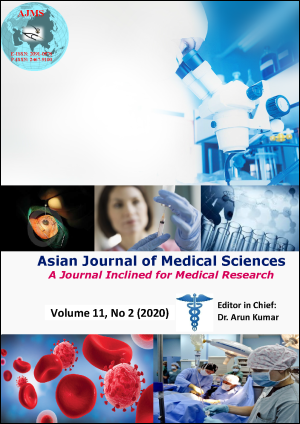Antibacterial activity of ginger extracts on bacteria isolated from digestive tract infection patients attended Muhoza Health Center
Keywords:
Ginger, Extracts, Inhibition zone, AntibacterialAbstract
Background: Ginger (Zingiber officinale) has been used for long time due to its potential antimicrobial activity against diversity of microbial pathogens.
Aims and Objectives: The study was carried out to investigate the bacteria pathogens found in digestive tract infections and assess antimicrobial activities of ginger extract to identified bacteria.
Materials and Methods: Bacteriological studies were carried out on stool samples from 30 patients attending Muhoza health center. Different types of bacteria were isolated from stool samples of digestive tract infection patients by using various methods such culture, biochemical test and antimicrobial activity of ginger extracts was analyzed at INES-Ruhengeri in clinical microbiology laboratory.
Results: Study findings showed isolated bacteria and antibacterial activity of Ginger. Isolated bacteria and their percentages including Escherichia coli (46.6%) which is the predominant isolated bacteria, Salmonella species (33.33%), Enterobacter spp (10.0%), Shigella spp (6.6%) and Citrobacter (3.33%) which is the least isolated bacteria. Antibacterial activity of ginger was seen on isolated bacteria, as ethanol and methanol were used for ginger oil extraction, the antibacterial activity of ginger extracts using ethanol was seen on isolated bacteria such us Citrobacter spp with 14 mm of inhibition zone, Shigella spp with 12 mm, Salmonella with 11.1 mm, E. coli with 9.5 mm and Enterobacter spp which was seen to be resistant to ginger extract using ethanol with 0.66mm of inhibition zone. For methanol extracts antibacterial activity was seen as follows: Citrobacter spp at 12 mm, Shigella spp at 11 mm, E. coli at 8 mm, salmonella spp at 6.1 mm, and Enterobacter spp with 5 mm. Enterobacter spp was seen to be the most resistant bacteria in both extracts.
Conclusion: Ginger has shown to have an antibacterial activity on bacteria isolated from digestive tract infected patients. It can be used as a medicine to treat these infections. Number of researches should be done to be sure on this reality of antibacterial activity of ginger.
Downloads
Downloads
Published
How to Cite
Issue
Section
License
Authors who publish with this journal agree to the following terms:
- The journal holds copyright and publishes the work under a Creative Commons CC-BY-NC license that permits use, distribution and reprduction in any medium, provided the original work is properly cited and is not used for commercial purposes. The journal should be recognised as the original publisher of this work.
- Authors are able to enter into separate, additional contractual arrangements for the non-exclusive distribution of the journal's published version of the work (e.g., post it to an institutional repository or publish it in a book), with an acknowledgement of its initial publication in this journal.
- Authors are permitted and encouraged to post their work online (e.g., in institutional repositories or on their website) prior to and during the submission process, as it can lead to productive exchanges, as well as earlier and greater citation of published work (See The Effect of Open Access).




